Exploring Postpartum Depression: Key Issues, Policies & Theories
VerifiedAdded on 2023/06/18
|15
|1658
|176
Presentation
AI Summary
This presentation provides an overview of postpartum depression, highlighting key issues affecting postpartum women, including prior history of depression, multiple children, and lack of support. It discusses current policies in place to protect these women, such as education mandates and mandatory screening during pregnancy, and their influence on health and social care. The presentation also explores various theories, including biological, psychosocial, social and interpersonal, and behavioral theories, as well as the impact of politics on postnatal women's mental health. The conclusion emphasizes the important role of health and social care in providing services and reducing the complexities associated with postpartum depression. Desklib offers more resources and solved assignments for students.
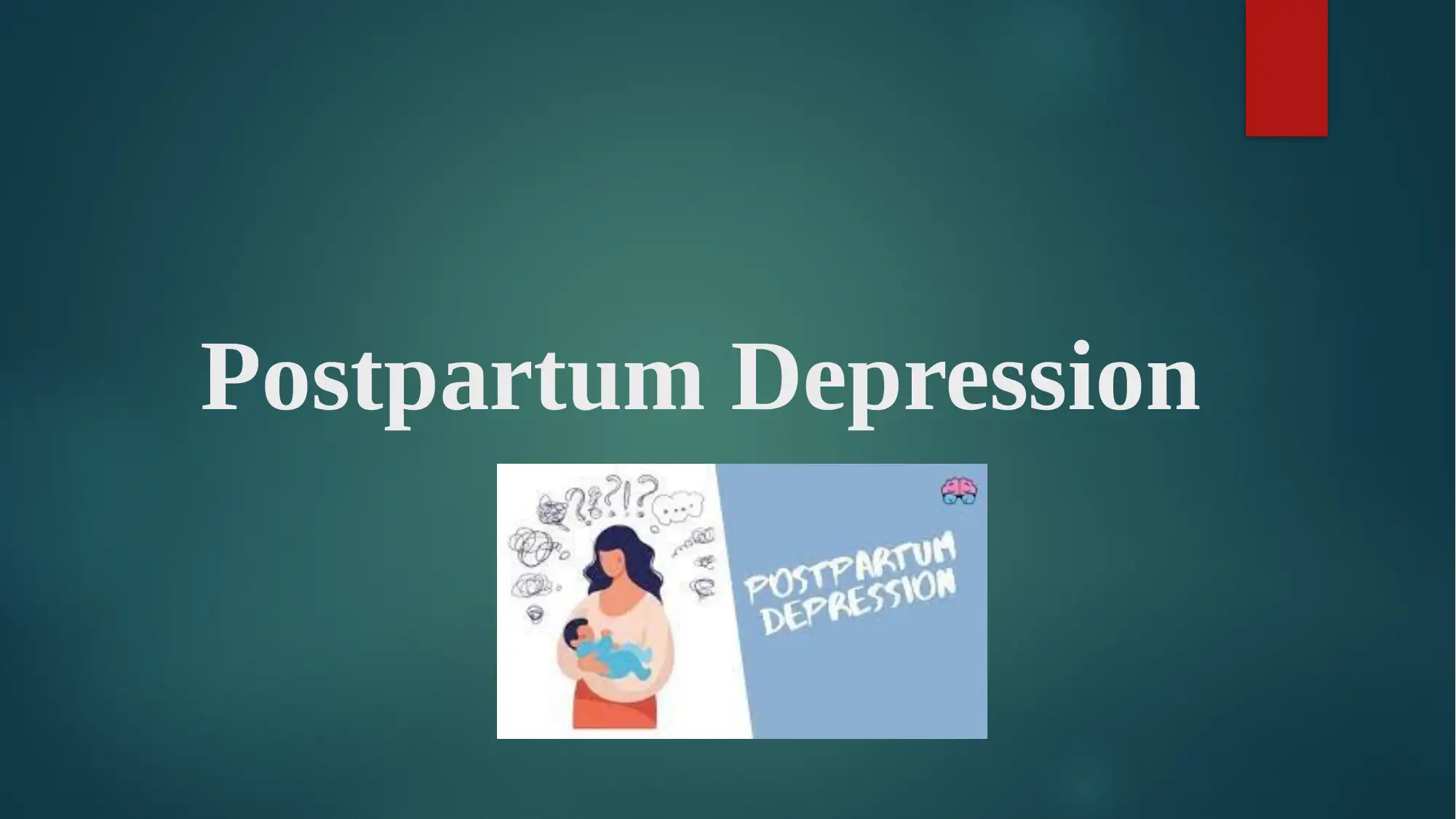
Postpartum Depression
Paraphrase This Document
Need a fresh take? Get an instant paraphrase of this document with our AI Paraphraser
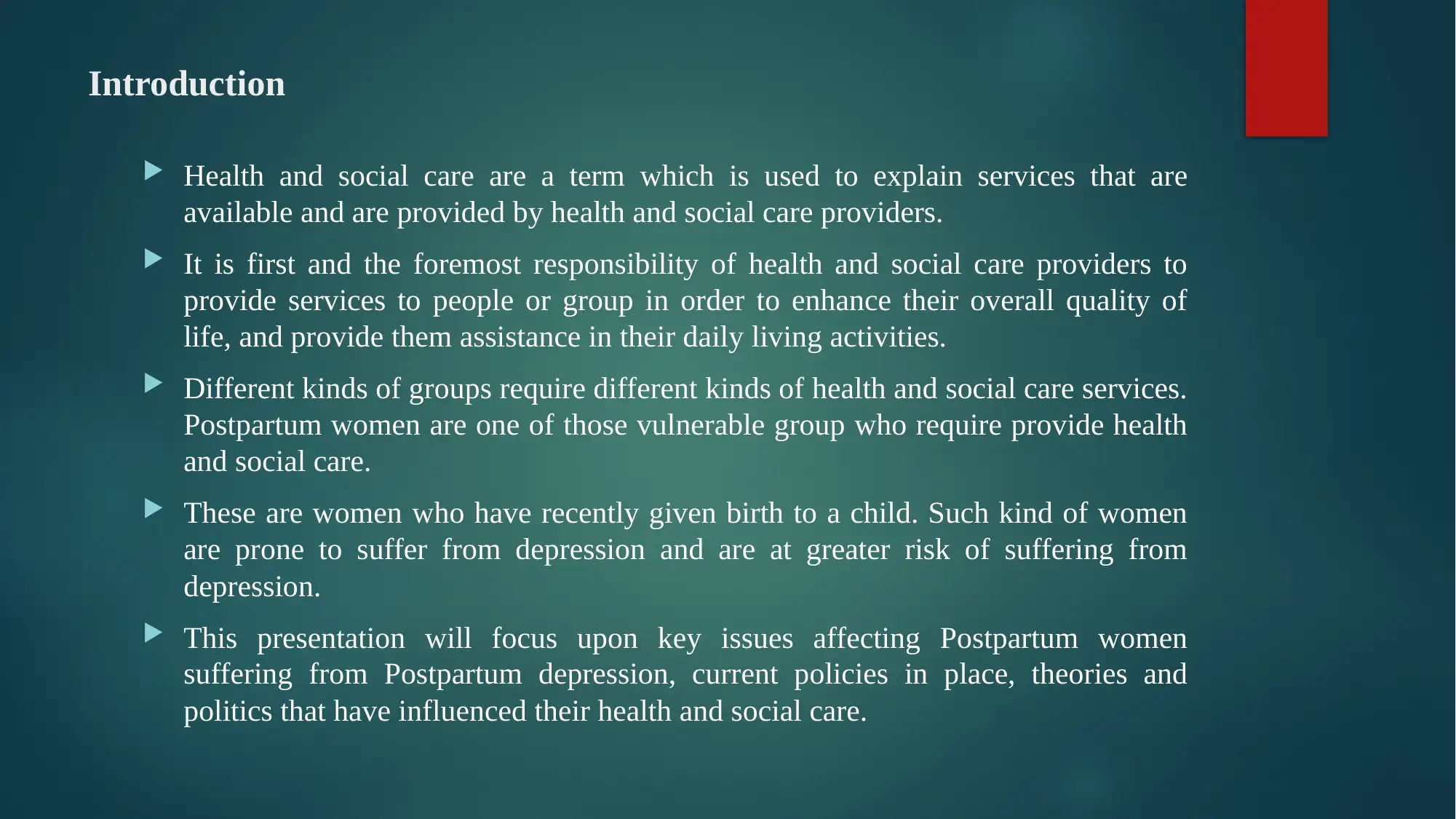
Introduction
Health and social care are a term which is used to explain services that are
available and are provided by health and social care providers.
It is first and the foremost responsibility of health and social care providers to
provide services to people or group in order to enhance their overall quality of
life, and provide them assistance in their daily living activities.
Different kinds of groups require different kinds of health and social care services.
Postpartum women are one of those vulnerable group who require provide health
and social care.
These are women who have recently given birth to a child. Such kind of women
are prone to suffer from depression and are at greater risk of suffering from
depression.
This presentation will focus upon key issues affecting Postpartum women
suffering from Postpartum depression, current policies in place, theories and
politics that have influenced their health and social care.
Health and social care are a term which is used to explain services that are
available and are provided by health and social care providers.
It is first and the foremost responsibility of health and social care providers to
provide services to people or group in order to enhance their overall quality of
life, and provide them assistance in their daily living activities.
Different kinds of groups require different kinds of health and social care services.
Postpartum women are one of those vulnerable group who require provide health
and social care.
These are women who have recently given birth to a child. Such kind of women
are prone to suffer from depression and are at greater risk of suffering from
depression.
This presentation will focus upon key issues affecting Postpartum women
suffering from Postpartum depression, current policies in place, theories and
politics that have influenced their health and social care.
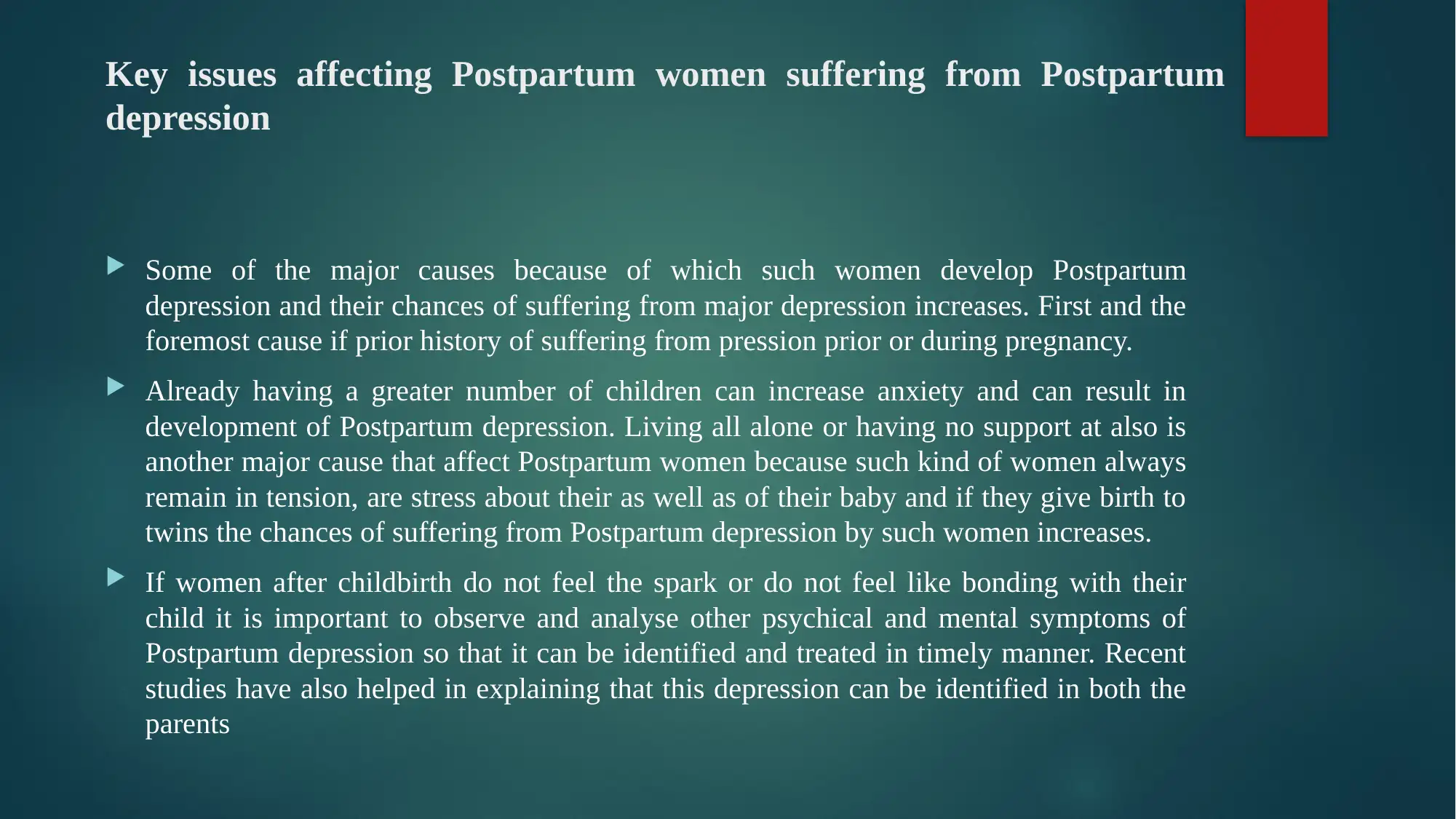
Key issues affecting Postpartum women suffering from Postpartum
depression
Some of the major causes because of which such women develop Postpartum
depression and their chances of suffering from major depression increases. First and the
foremost cause if prior history of suffering from pression prior or during pregnancy.
Already having a greater number of children can increase anxiety and can result in
development of Postpartum depression. Living all alone or having no support at also is
another major cause that affect Postpartum women because such kind of women always
remain in tension, are stress about their as well as of their baby and if they give birth to
twins the chances of suffering from Postpartum depression by such women increases.
If women after childbirth do not feel the spark or do not feel like bonding with their
child it is important to observe and analyse other psychical and mental symptoms of
Postpartum depression so that it can be identified and treated in timely manner. Recent
studies have also helped in explaining that this depression can be identified in both the
parents
depression
Some of the major causes because of which such women develop Postpartum
depression and their chances of suffering from major depression increases. First and the
foremost cause if prior history of suffering from pression prior or during pregnancy.
Already having a greater number of children can increase anxiety and can result in
development of Postpartum depression. Living all alone or having no support at also is
another major cause that affect Postpartum women because such kind of women always
remain in tension, are stress about their as well as of their baby and if they give birth to
twins the chances of suffering from Postpartum depression by such women increases.
If women after childbirth do not feel the spark or do not feel like bonding with their
child it is important to observe and analyse other psychical and mental symptoms of
Postpartum depression so that it can be identified and treated in timely manner. Recent
studies have also helped in explaining that this depression can be identified in both the
parents
⊘ This is a preview!⊘
Do you want full access?
Subscribe today to unlock all pages.

Trusted by 1+ million students worldwide
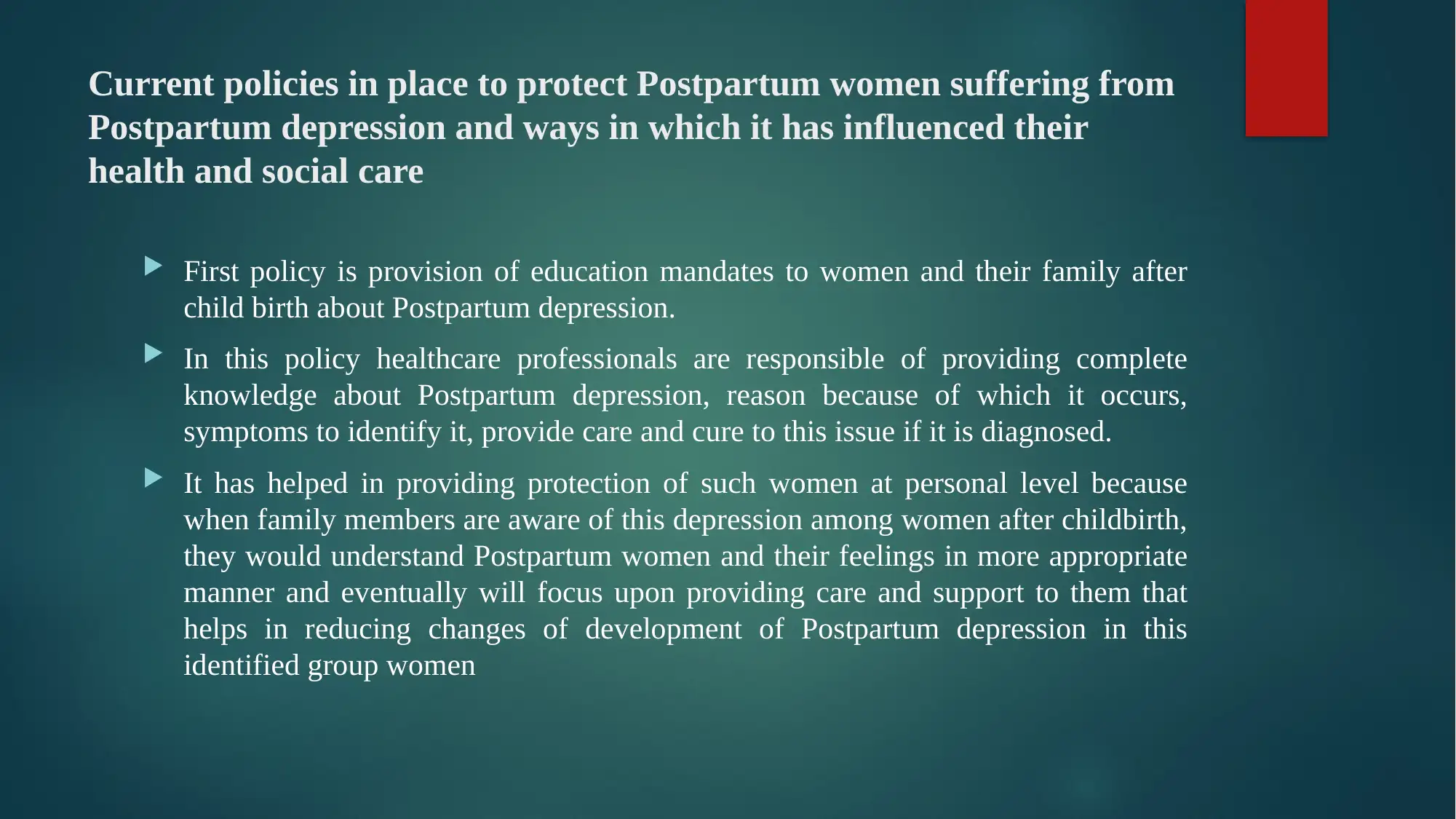
Current policies in place to protect Postpartum women suffering from
Postpartum depression and ways in which it has influenced their
health and social care
First policy is provision of education mandates to women and their family after
child birth about Postpartum depression.
In this policy healthcare professionals are responsible of providing complete
knowledge about Postpartum depression, reason because of which it occurs,
symptoms to identify it, provide care and cure to this issue if it is diagnosed.
It has helped in providing protection of such women at personal level because
when family members are aware of this depression among women after childbirth,
they would understand Postpartum women and their feelings in more appropriate
manner and eventually will focus upon providing care and support to them that
helps in reducing changes of development of Postpartum depression in this
identified group women
Postpartum depression and ways in which it has influenced their
health and social care
First policy is provision of education mandates to women and their family after
child birth about Postpartum depression.
In this policy healthcare professionals are responsible of providing complete
knowledge about Postpartum depression, reason because of which it occurs,
symptoms to identify it, provide care and cure to this issue if it is diagnosed.
It has helped in providing protection of such women at personal level because
when family members are aware of this depression among women after childbirth,
they would understand Postpartum women and their feelings in more appropriate
manner and eventually will focus upon providing care and support to them that
helps in reducing changes of development of Postpartum depression in this
identified group women
Paraphrase This Document
Need a fresh take? Get an instant paraphrase of this document with our AI Paraphraser
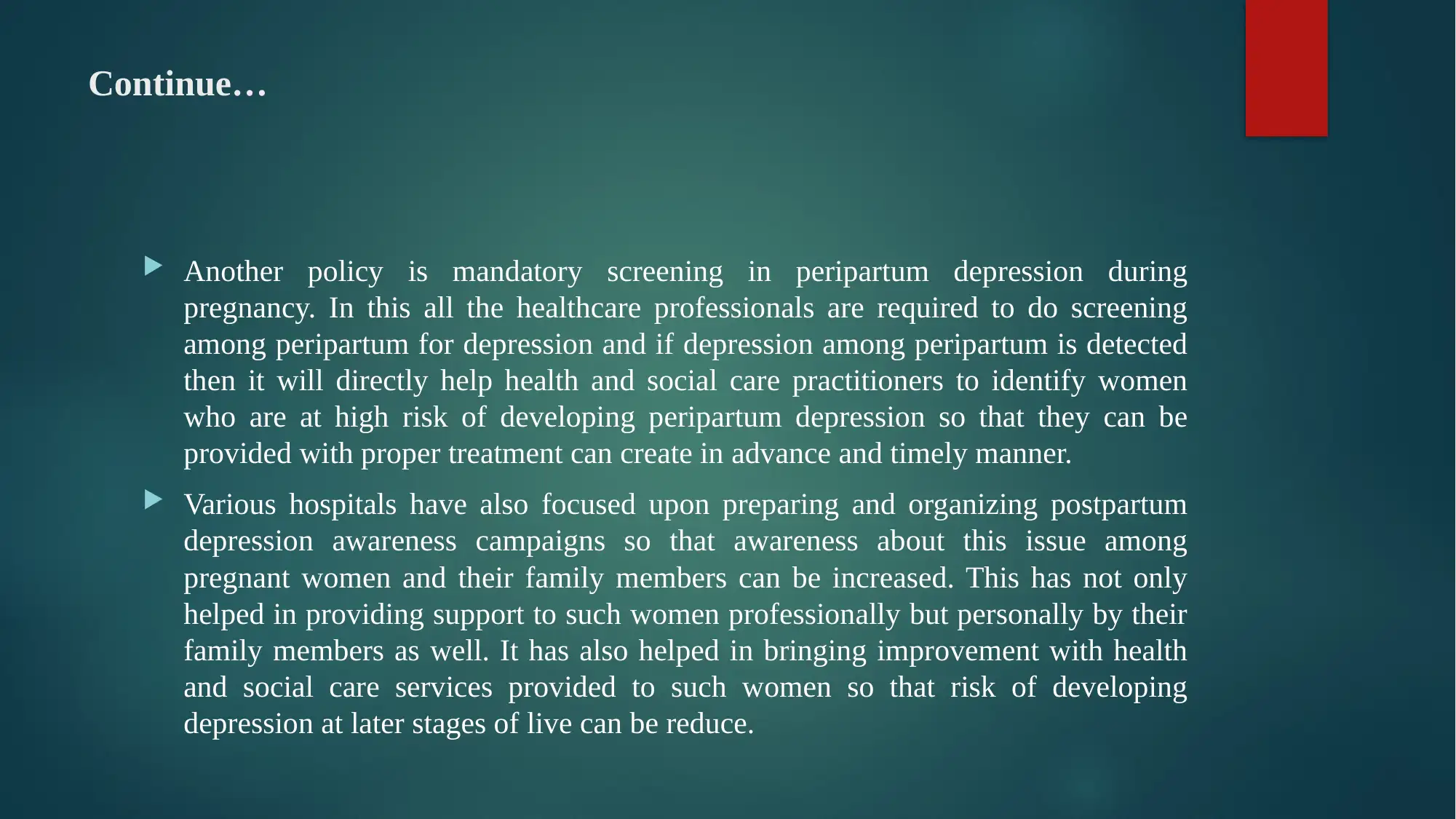
Continue…
Another policy is mandatory screening in peripartum depression during
pregnancy. In this all the healthcare professionals are required to do screening
among peripartum for depression and if depression among peripartum is detected
then it will directly help health and social care practitioners to identify women
who are at high risk of developing peripartum depression so that they can be
provided with proper treatment can create in advance and timely manner.
Various hospitals have also focused upon preparing and organizing postpartum
depression awareness campaigns so that awareness about this issue among
pregnant women and their family members can be increased. This has not only
helped in providing support to such women professionally but personally by their
family members as well. It has also helped in bringing improvement with health
and social care services provided to such women so that risk of developing
depression at later stages of live can be reduce.
Another policy is mandatory screening in peripartum depression during
pregnancy. In this all the healthcare professionals are required to do screening
among peripartum for depression and if depression among peripartum is detected
then it will directly help health and social care practitioners to identify women
who are at high risk of developing peripartum depression so that they can be
provided with proper treatment can create in advance and timely manner.
Various hospitals have also focused upon preparing and organizing postpartum
depression awareness campaigns so that awareness about this issue among
pregnant women and their family members can be increased. This has not only
helped in providing support to such women professionally but personally by their
family members as well. It has also helped in bringing improvement with health
and social care services provided to such women so that risk of developing
depression at later stages of live can be reduce.
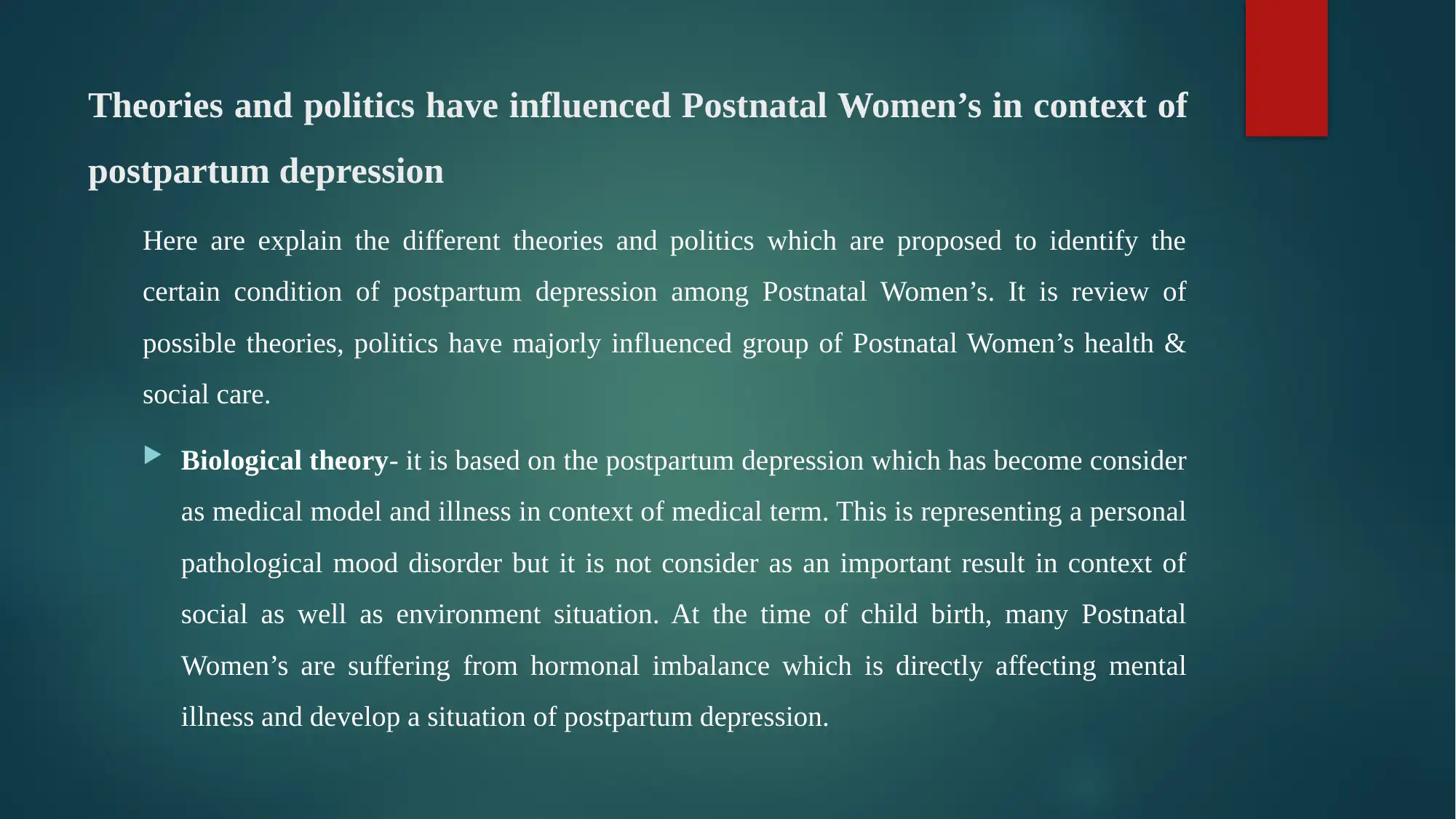
Theories and politics have influenced Postnatal Women’s in context of
postpartum depression
Here are explain the different theories and politics which are proposed to identify the
certain condition of postpartum depression among Postnatal Women’s. It is review of
possible theories, politics have majorly influenced group of Postnatal Women’s health &
social care.
Biological theory- it is based on the postpartum depression which has become consider
as medical model and illness in context of medical term. This is representing a personal
pathological mood disorder but it is not consider as an important result in context of
social as well as environment situation. At the time of child birth, many Postnatal
Women’s are suffering from hormonal imbalance which is directly affecting mental
illness and develop a situation of postpartum depression.
postpartum depression
Here are explain the different theories and politics which are proposed to identify the
certain condition of postpartum depression among Postnatal Women’s. It is review of
possible theories, politics have majorly influenced group of Postnatal Women’s health &
social care.
Biological theory- it is based on the postpartum depression which has become consider
as medical model and illness in context of medical term. This is representing a personal
pathological mood disorder but it is not consider as an important result in context of
social as well as environment situation. At the time of child birth, many Postnatal
Women’s are suffering from hormonal imbalance which is directly affecting mental
illness and develop a situation of postpartum depression.
⊘ This is a preview!⊘
Do you want full access?
Subscribe today to unlock all pages.

Trusted by 1+ million students worldwide
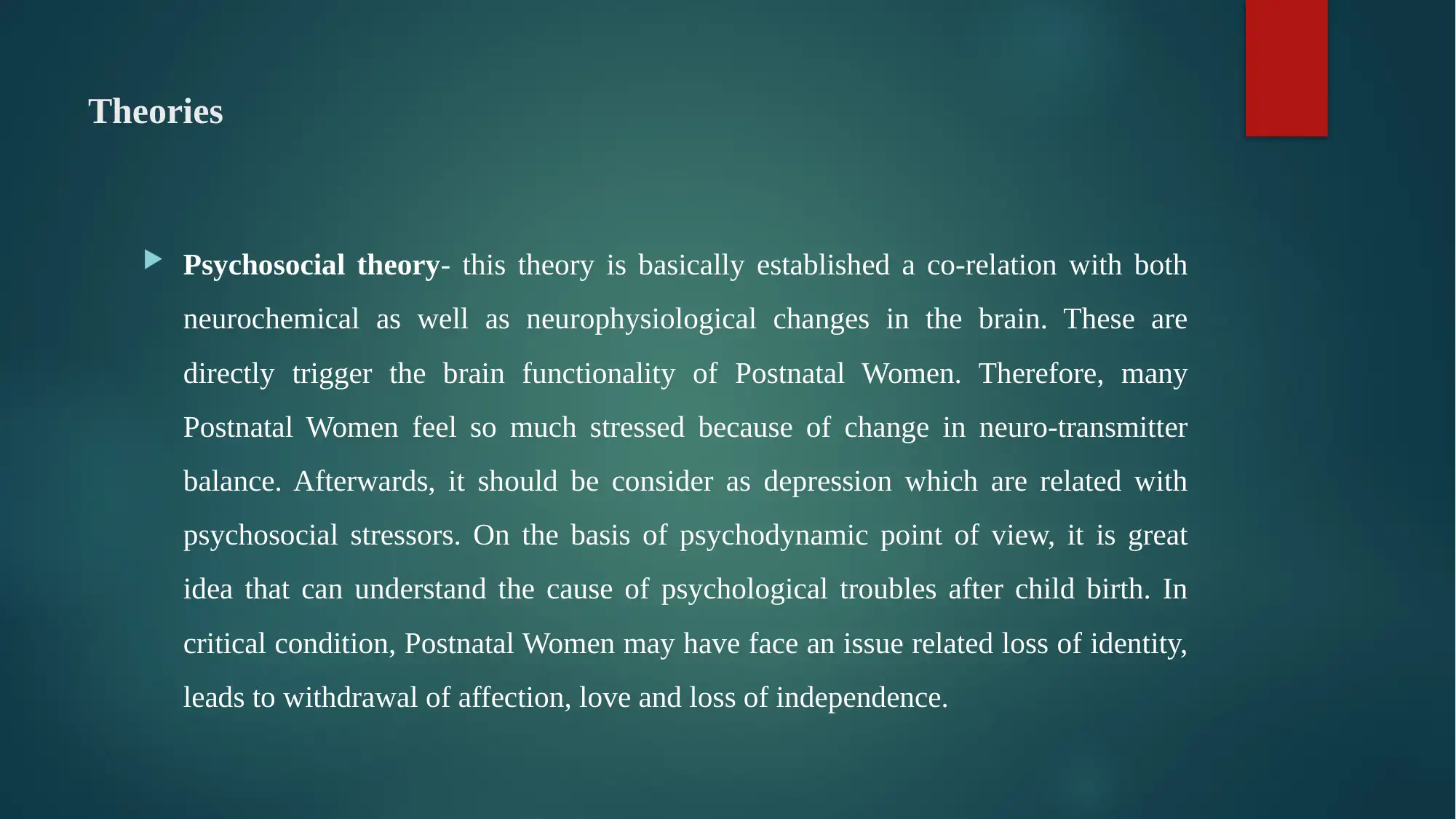
Theories
Psychosocial theory- this theory is basically established a co-relation with both
neurochemical as well as neurophysiological changes in the brain. These are
directly trigger the brain functionality of Postnatal Women. Therefore, many
Postnatal Women feel so much stressed because of change in neuro-transmitter
balance. Afterwards, it should be consider as depression which are related with
psychosocial stressors. On the basis of psychodynamic point of view, it is great
idea that can understand the cause of psychological troubles after child birth. In
critical condition, Postnatal Women may have face an issue related loss of identity,
leads to withdrawal of affection, love and loss of independence.
Psychosocial theory- this theory is basically established a co-relation with both
neurochemical as well as neurophysiological changes in the brain. These are
directly trigger the brain functionality of Postnatal Women. Therefore, many
Postnatal Women feel so much stressed because of change in neuro-transmitter
balance. Afterwards, it should be consider as depression which are related with
psychosocial stressors. On the basis of psychodynamic point of view, it is great
idea that can understand the cause of psychological troubles after child birth. In
critical condition, Postnatal Women may have face an issue related loss of identity,
leads to withdrawal of affection, love and loss of independence.
Paraphrase This Document
Need a fresh take? Get an instant paraphrase of this document with our AI Paraphraser
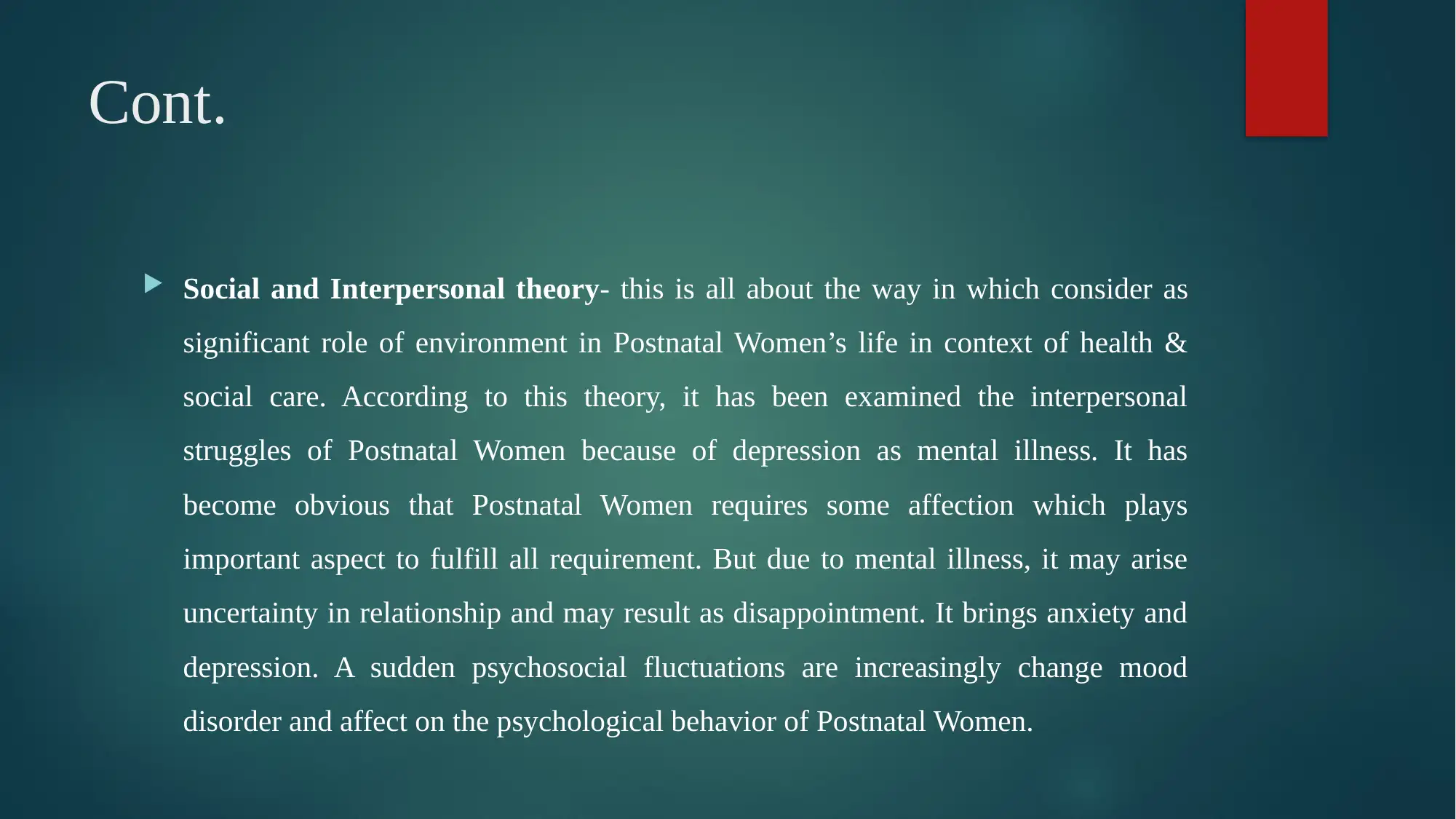
Cont.
Social and Interpersonal theory- this is all about the way in which consider as
significant role of environment in Postnatal Women’s life in context of health &
social care. According to this theory, it has been examined the interpersonal
struggles of Postnatal Women because of depression as mental illness. It has
become obvious that Postnatal Women requires some affection which plays
important aspect to fulfill all requirement. But due to mental illness, it may arise
uncertainty in relationship and may result as disappointment. It brings anxiety and
depression. A sudden psychosocial fluctuations are increasingly change mood
disorder and affect on the psychological behavior of Postnatal Women.
Social and Interpersonal theory- this is all about the way in which consider as
significant role of environment in Postnatal Women’s life in context of health &
social care. According to this theory, it has been examined the interpersonal
struggles of Postnatal Women because of depression as mental illness. It has
become obvious that Postnatal Women requires some affection which plays
important aspect to fulfill all requirement. But due to mental illness, it may arise
uncertainty in relationship and may result as disappointment. It brings anxiety and
depression. A sudden psychosocial fluctuations are increasingly change mood
disorder and affect on the psychological behavior of Postnatal Women.
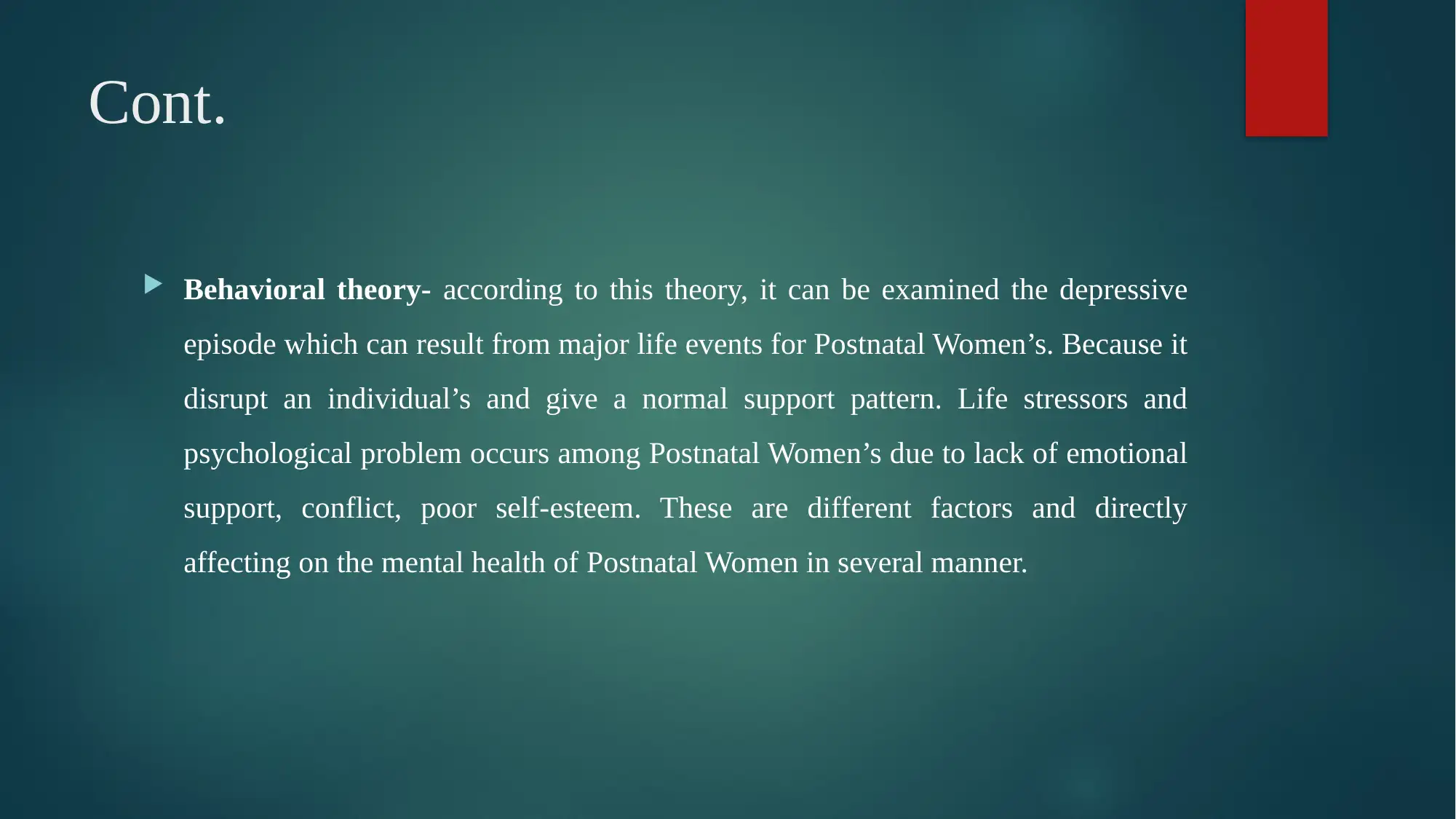
Cont.
Behavioral theory- according to this theory, it can be examined the depressive
episode which can result from major life events for Postnatal Women’s. Because it
disrupt an individual’s and give a normal support pattern. Life stressors and
psychological problem occurs among Postnatal Women’s due to lack of emotional
support, conflict, poor self-esteem. These are different factors and directly
affecting on the mental health of Postnatal Women in several manner.
Behavioral theory- according to this theory, it can be examined the depressive
episode which can result from major life events for Postnatal Women’s. Because it
disrupt an individual’s and give a normal support pattern. Life stressors and
psychological problem occurs among Postnatal Women’s due to lack of emotional
support, conflict, poor self-esteem. These are different factors and directly
affecting on the mental health of Postnatal Women in several manner.
⊘ This is a preview!⊘
Do you want full access?
Subscribe today to unlock all pages.

Trusted by 1+ million students worldwide
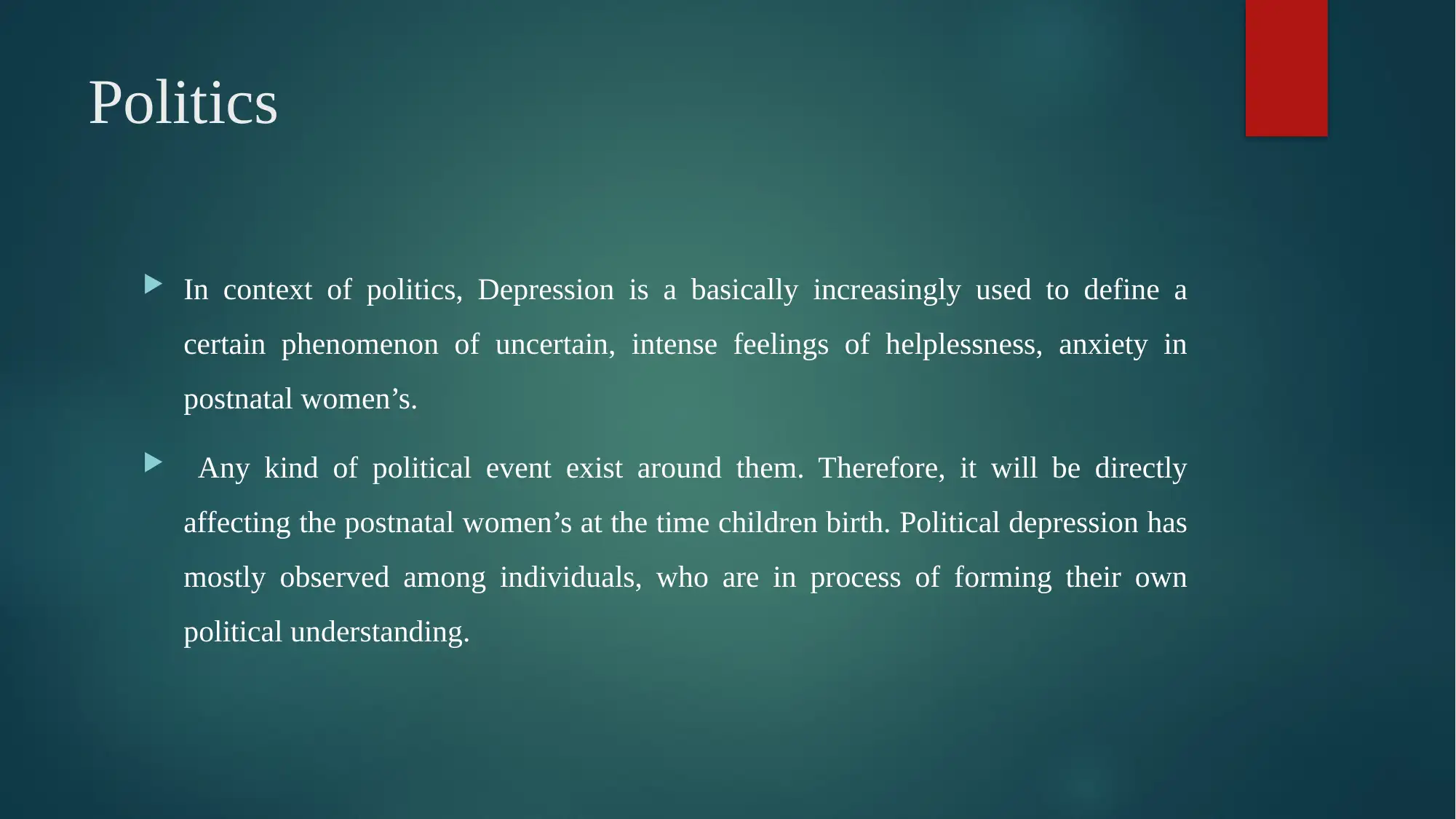
Politics
In context of politics, Depression is a basically increasingly used to define a
certain phenomenon of uncertain, intense feelings of helplessness, anxiety in
postnatal women’s.
Any kind of political event exist around them. Therefore, it will be directly
affecting the postnatal women’s at the time children birth. Political depression has
mostly observed among individuals, who are in process of forming their own
political understanding.
In context of politics, Depression is a basically increasingly used to define a
certain phenomenon of uncertain, intense feelings of helplessness, anxiety in
postnatal women’s.
Any kind of political event exist around them. Therefore, it will be directly
affecting the postnatal women’s at the time children birth. Political depression has
mostly observed among individuals, who are in process of forming their own
political understanding.
Paraphrase This Document
Need a fresh take? Get an instant paraphrase of this document with our AI Paraphraser
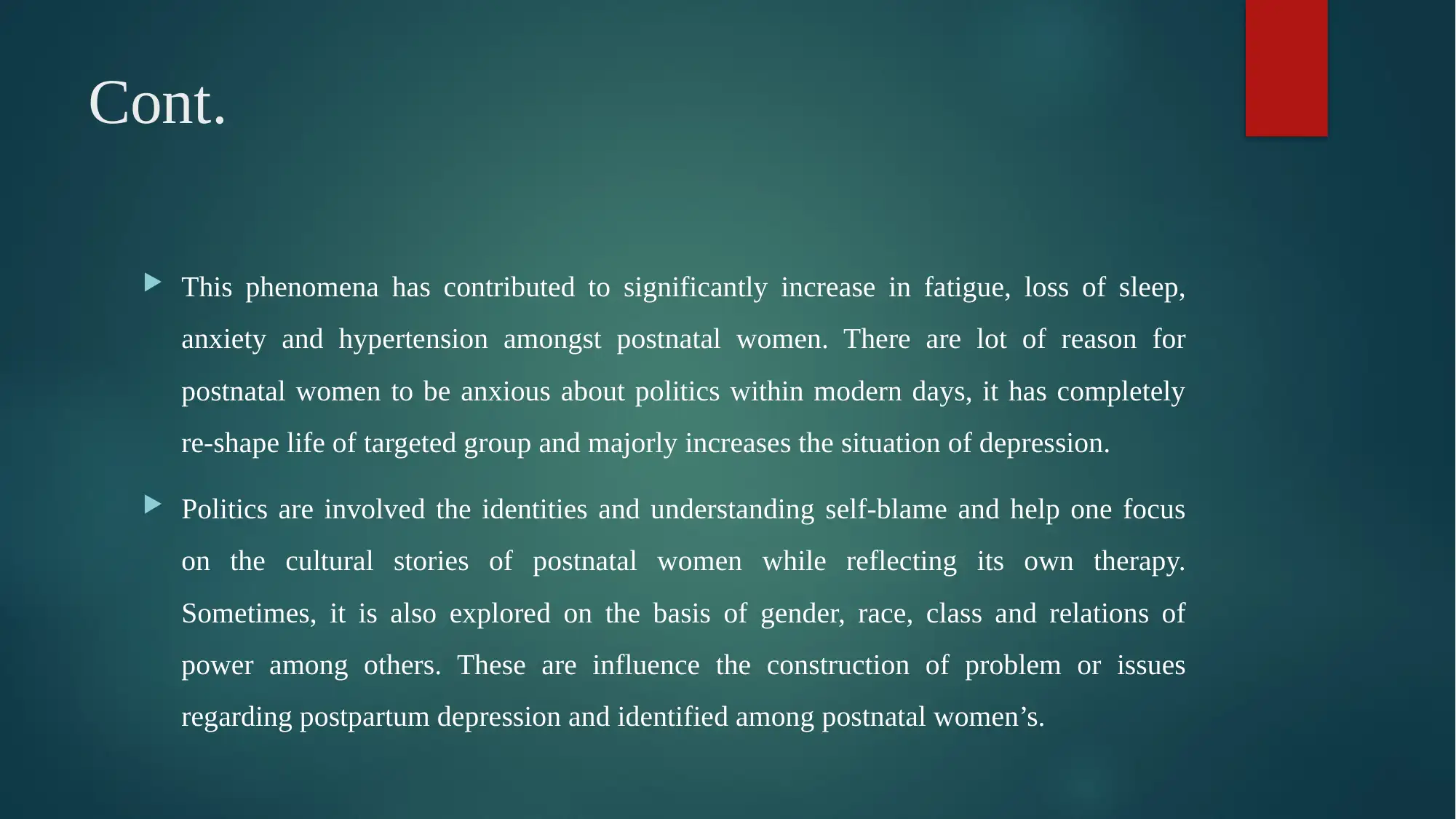
Cont.
This phenomena has contributed to significantly increase in fatigue, loss of sleep,
anxiety and hypertension amongst postnatal women. There are lot of reason for
postnatal women to be anxious about politics within modern days, it has completely
re-shape life of targeted group and majorly increases the situation of depression.
Politics are involved the identities and understanding self-blame and help one focus
on the cultural stories of postnatal women while reflecting its own therapy.
Sometimes, it is also explored on the basis of gender, race, class and relations of
power among others. These are influence the construction of problem or issues
regarding postpartum depression and identified among postnatal women’s.
This phenomena has contributed to significantly increase in fatigue, loss of sleep,
anxiety and hypertension amongst postnatal women. There are lot of reason for
postnatal women to be anxious about politics within modern days, it has completely
re-shape life of targeted group and majorly increases the situation of depression.
Politics are involved the identities and understanding self-blame and help one focus
on the cultural stories of postnatal women while reflecting its own therapy.
Sometimes, it is also explored on the basis of gender, race, class and relations of
power among others. These are influence the construction of problem or issues
regarding postpartum depression and identified among postnatal women’s.
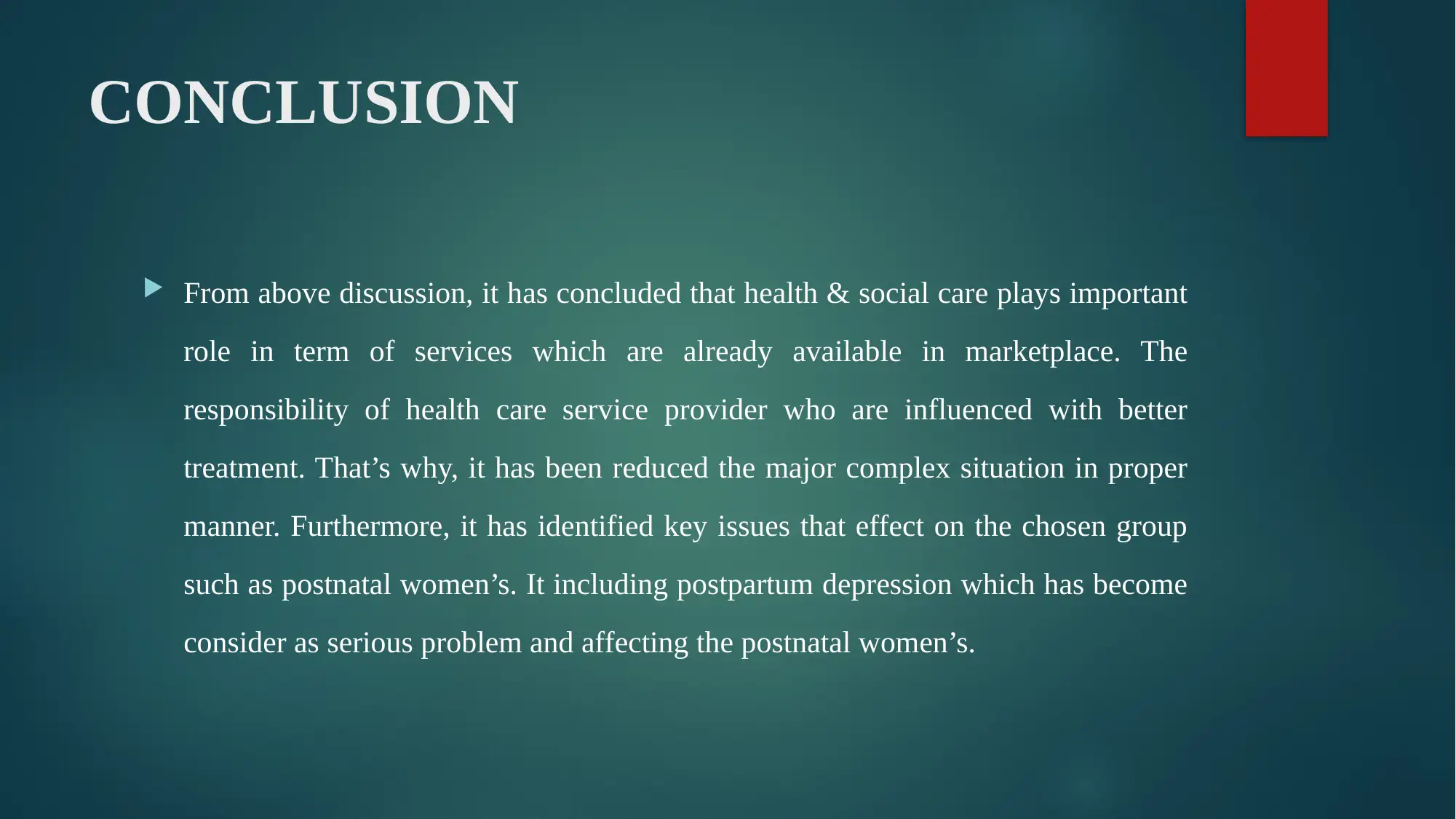
CONCLUSION
From above discussion, it has concluded that health & social care plays important
role in term of services which are already available in marketplace. The
responsibility of health care service provider who are influenced with better
treatment. That’s why, it has been reduced the major complex situation in proper
manner. Furthermore, it has identified key issues that effect on the chosen group
such as postnatal women’s. It including postpartum depression which has become
consider as serious problem and affecting the postnatal women’s.
From above discussion, it has concluded that health & social care plays important
role in term of services which are already available in marketplace. The
responsibility of health care service provider who are influenced with better
treatment. That’s why, it has been reduced the major complex situation in proper
manner. Furthermore, it has identified key issues that effect on the chosen group
such as postnatal women’s. It including postpartum depression which has become
consider as serious problem and affecting the postnatal women’s.
⊘ This is a preview!⊘
Do you want full access?
Subscribe today to unlock all pages.

Trusted by 1+ million students worldwide
1 out of 15
Related Documents
Your All-in-One AI-Powered Toolkit for Academic Success.
+13062052269
info@desklib.com
Available 24*7 on WhatsApp / Email
![[object Object]](/_next/static/media/star-bottom.7253800d.svg)
Unlock your academic potential
Copyright © 2020–2026 A2Z Services. All Rights Reserved. Developed and managed by ZUCOL.





